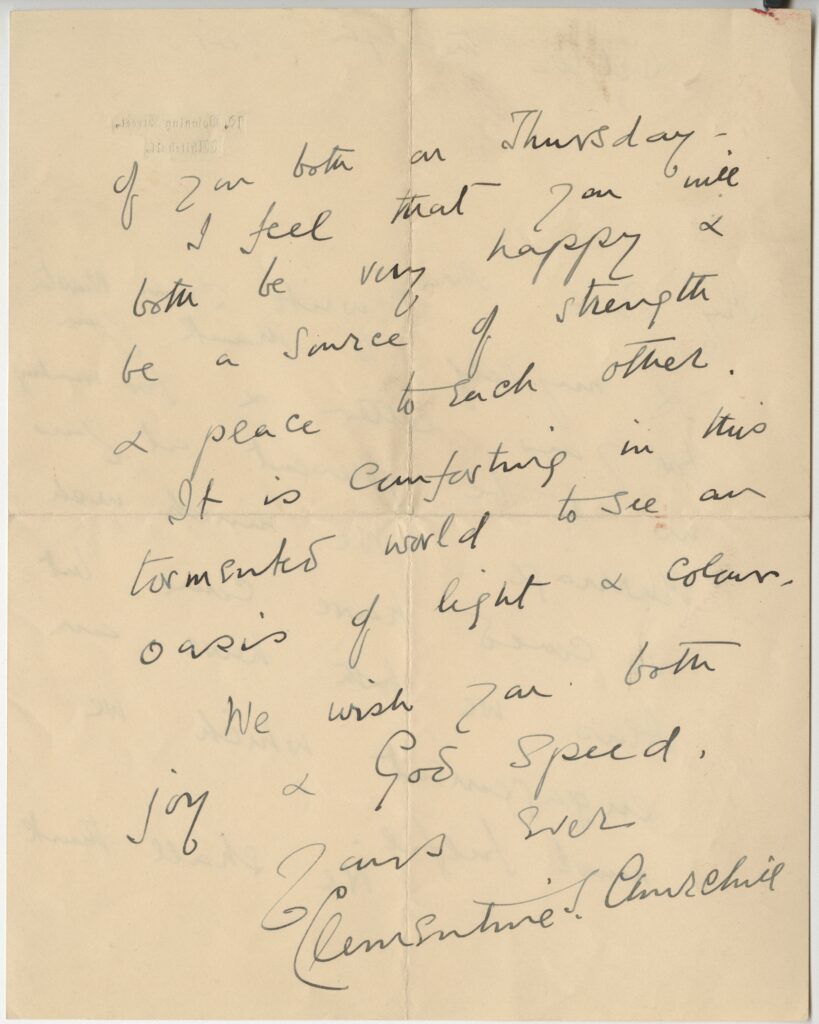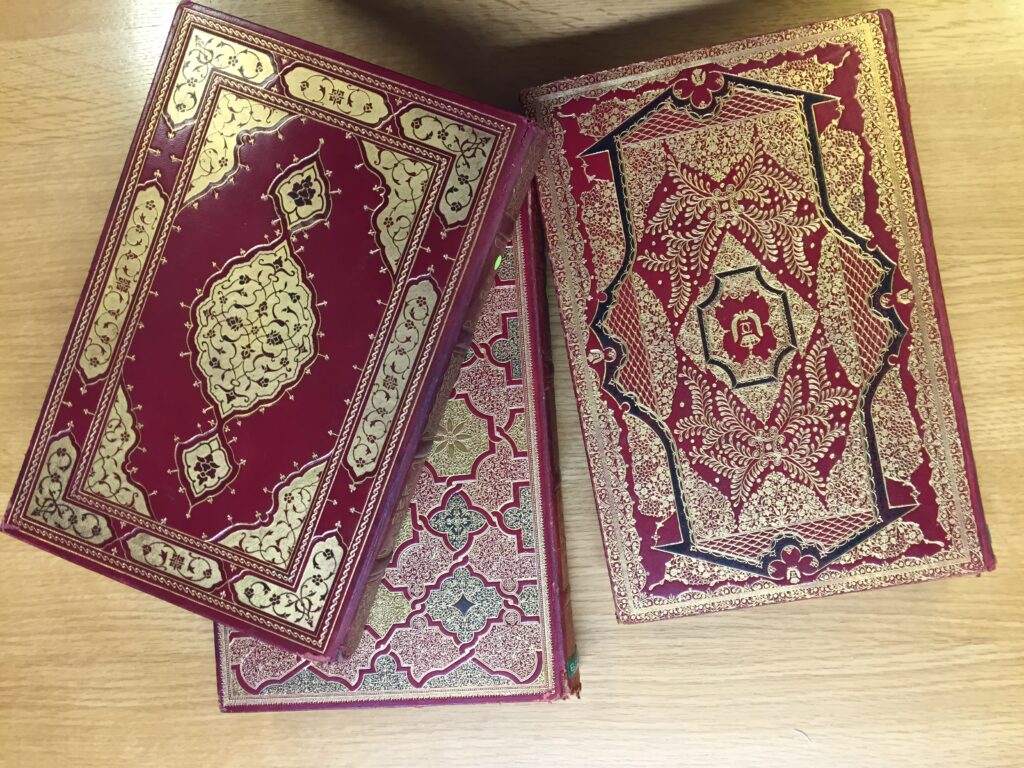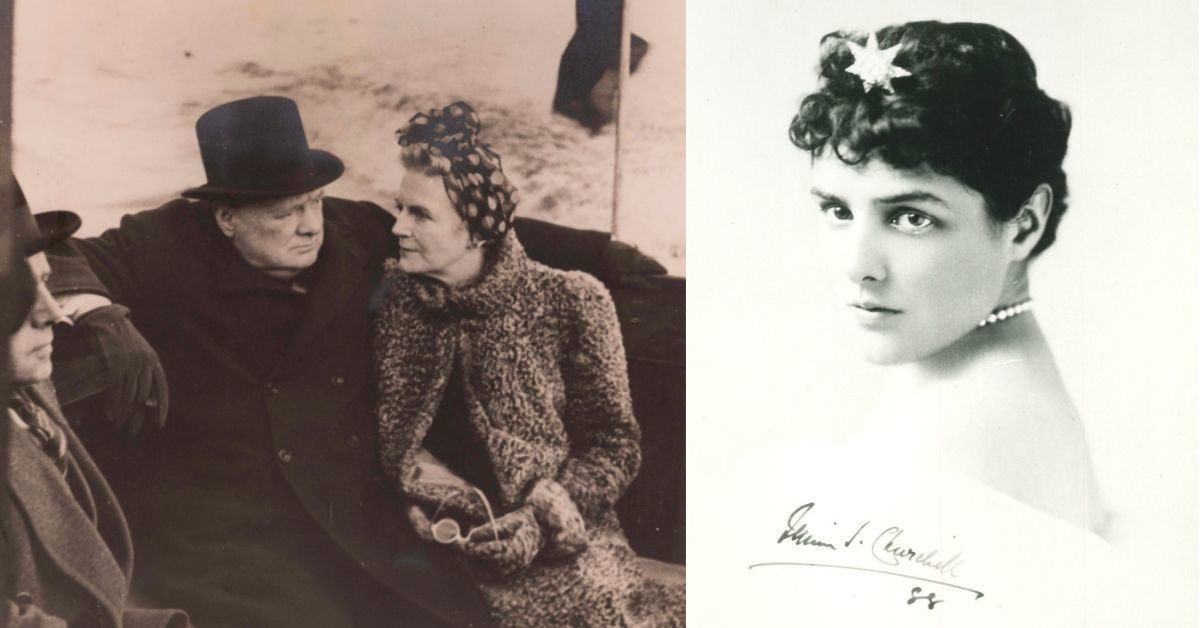We’ve received two more exciting new accessions this week: two files of largely unknown personal letters, one set written by Clementine Churchill to her friend Ava Waverley, and the other by her mother-in-law Lady Randolph Churchill (described by one admirer as having “more of the panther than of the woman in her look“) to her sister Leonie.
The political hostess Ava Waverley had been a friend of both Churchills since the 1930s, when she was the wife of the diplomat Ralph Wigram. He died in 1936 and in 1941 she married Sir John Anderson, Home Secretary in the wartime Cabinet (later Lord Waverley). Clementine’s letters to Ava begin with this second marriage to Anderson, writing that they would be “a source of strength & peace to each other” and that it was “comforting in this tormented world to see an oasis of light & colour”. In later letters Clementine goes on to reminisce about visiting the London docks on a Thames launch after a terrible bombing raid in 1940 (seen in the image above), confides her worries to Ava about Churchill’s stroke in 1953 and sends her heartfelt sympathy to her after the deaths of first Ava’s son and then of her husband, when in 1958 Ava found herself a widow once again.

The letters of the panther-like Lady Randolph Churchill, or Jennie, are even more personal, written as they are to a close family member. Jennie’s letters to Leonie run from 1898 to 1919, and though they start with Jennie at the height of her glamour and success, happily listing her Christmas presents from the Prince of Wales (a former lover of hers) and Princess Alexandra: “Quite a nice lot of presents I’ve had. The Prince a Fabergé monster & the Princess a brooch”, her letters gradually take on a sadder tone. The daughter of a wealthy American financier, Jennie was never particularly good at hanging on to money herself. In her first letter, she talks about her ambitious plans for the literary magazine she was planning, the Anglo-Saxon Review: “of course the financial part will be carried on in the most business like manner & if the Magazine is a success, as it must be – the syndicate won’t lose & will be returned their money with a profit.” Sadly the Review was so expensive to run, with its stunning leather bindings, that it went bust after just ten issues.

Money (or the lack of it) is a recurring theme. As early as 1903 Jennie laments that “I am rather low just now. The usual £.S.D question – but rather acute”, while towards the end of her life she writes grimly “as one grows older it is no use hiding it from oneself – one’s bed & ‘board’ play a serious part in one’s life.”
Jennie’s marriage to her second husband, George Cornwallis-West, a famously handsome Guards officer who was only days older than Jennie’s elder son Winston, was not a great success either. Jennie had engaged the well-known actress Mrs Patrick Campbell as the lead in one of her plays; she confided her worries about it to Leonie, fearing that it would never make a really good play, and she would hate mediocrity, but did not expect that her leading lady would end up making off with her husband. One of her saddest letters concerns her brave attempt to patch up the marriage:
“It is no use abusing George to me. I know his shortcomings, but am prepared to try & make the best of it. There was nothing between receiving him back or divorce – & the latter is a horrible thing. A public scandal is disgusting, if one can help it – Separation if impossible unless in a case like the Marlboroughs where there is lots of money & she kept what she got from him (ie) her position & title. Bless you darling – & forgive this letter all about myself. I still feel so ‘bruised’ that I can’t write. … Burn this letter.”
She and Cornwallis-West finally divorced in 1914, and a few years later Jennie married for a third time, to Montagu Porch, who was even younger than Winston. Her letters do become a little happier; she enjoyed Winston’s political success (she had helped campaign for him in Manchester in 1906, but was not a fan of votes for women, remarking to Leonie that “the Female suffrage women as you have probably seen by the papers are too odious. Every night they make a disturbance & shriek & rant – they damage their cause hopelessly“). Always busy with exciting new literary, political or philanthropic projects, she was determined “to keep up with modern ideas & life“, but finally died in 1921, glamorous to the end, after tripping in a pair of high-heeled party shoes.
Katharine Thomson, Archivist, November 2025.


